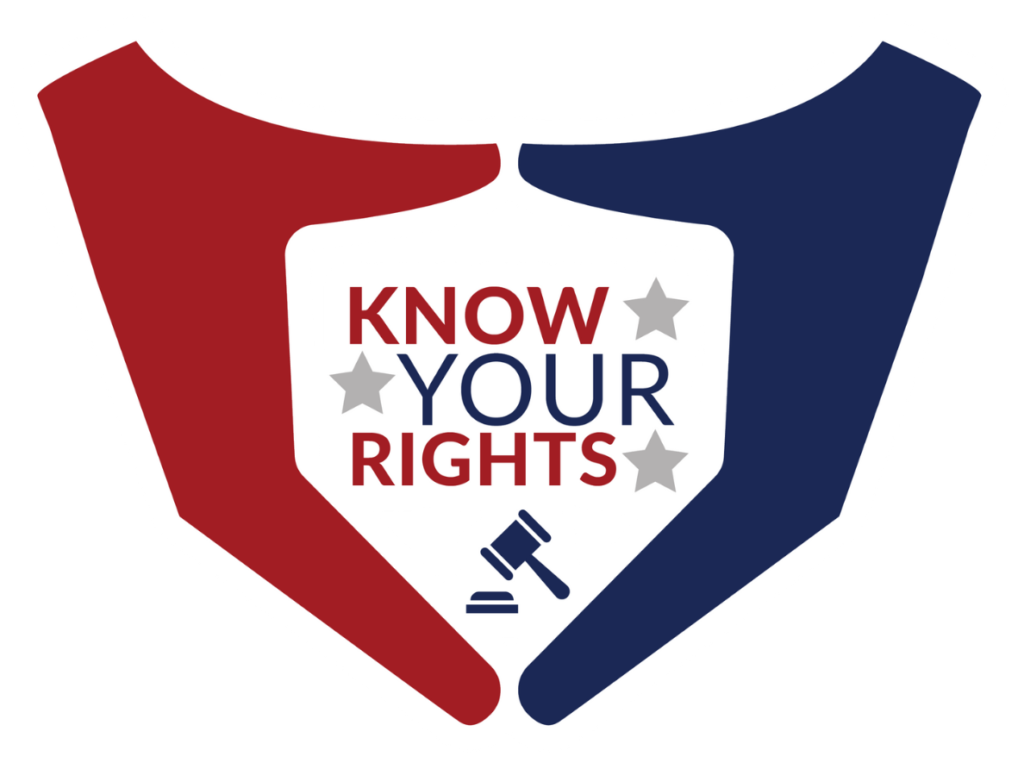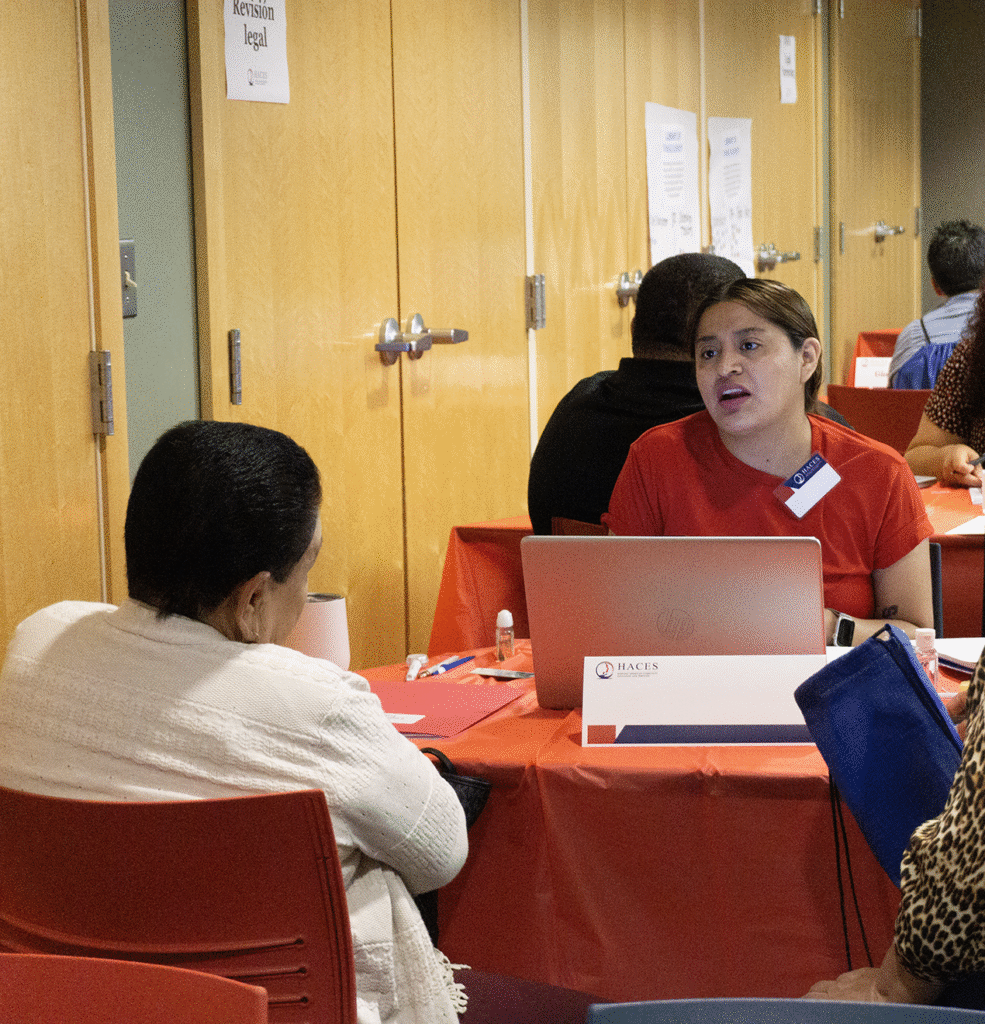HACES

Protect yourself, protect your loved ones. Protégase, proteja a sus seres queridos
Avoiding Fraud | Evitando Fraude
English
Finding a Trusted Legal Representative
Seeking legal help is important, but we ask you to be careful when doing so. Just because someone says they can help does not mean they are qualified to provide legal advice or complete immigration forms. There have been cases where individuals have received incorrect legal advice or had paperwork filled improperly, resulting in processing delays, additional fees, and even removal.
When seeking legal representative, be sure they are a licensed attorney or an individual accredited by the Department of Justice (DOJ). These individuals are accredited to provide legal advice as well as practice law in front of United States Citizenship and Immigration Services (USCIS) and immigration court.
How to Identify a Trusted Legal Representative
The following are markers to identify when seeking legal advice and immigration assistance:
The individual providing legal services must be a licensed attorney or accredited by the DOJ. Before hiring someone to represent or assist you, verify their credentials by checking your state’s Bar Association’s list of lawyers in good standing for the Department of Justice’s list of recognized organizations and accredited representatives. You can find that list here.
USCIS does not accept payments made through external money transfers such as Western Union, Paypal, Venmo, over the phone or via email. USCIS will also not ask you to transfer money to an individuals’ account. If these requests are made of you, they are likely a scam. If you believe you are being scammed, do not transfer money and seek out a licensed attorney or recognized organization.
USCIS forms are always free and available for download on the USCIS website. Never pay an individual or agency to access a a USCIS form. You can also pick up forms for free at your local USCIS office.
You are entitled to a written contract with your attorney that details the work being done for your case as well as the corresponding fees and expenses. A trusted attorney should also be willing to offer you receipts for payments made as well as record any changes in your agreement and have that available to you.
Do not sign blank documents or documents with false information on them! You may also request proof that your paperwork has been filled by asking for a copy of the government filing receipt.

Notary Public
A notary public, or a notario, is a person appointed by the state to serve as an impartial witness for the signing of important documents. They ensure that the signer is who they claim to be and that all signatures are voluntary. They ensure that the signer is who they claim to be and that all signatures are voluntary. Notaries verify signatures on documents to ensure their authenticity and prevent fraud. However, some notaries have made claims to have connections or hidden knowledge of immigration law that may guarantee an immigration benefit. This is fraud.
- Notaries are not licensed attorneys and are not allowed to provide legal advice unless they are accredited by the Department of Justice.
- If a licensed attorney has let you know that you are not eligible for immigration relief but a notary claims to know of a hidden way, they are likely trying to scam you.
Spanish
Encontrando un Representante Legal de Confianza
Buscar ayuda legal es importante, pero le pedimos que tenga cuidado al hacerlo. El hecho de que alguien diga que puede ayudar no significa que esté calificado para brindar asesoría legal o completar formularios de inmigración. Ha habido casos en los que personas han recibido asesoría legal incorrecta o han tenido formularios mal llenados, lo que ha resultado en demoras en el procesamiento, tarifas adicionales e incluso la deportación.
Al buscar un representante legal, asegúrese de que sea un abogado con licencia o una persona acreditada por el Departamento de Justicia (DOJ). Estas personas están autorizadas para brindar asesoría legal y ejercer ante el Servicio de Ciudadanía e Inmigración de los Estados Unidos (USCIS) y los tribunales de inmigración.
Cómo Identificar un Representate Legal Confiado
Los siguientes son indicadores a tener en cuenta al buscar asesoría legal y asistencia en inmigración:
La persona que brinda servicios legales debe ser un abogado con licencia o estar acreditado por el Departamento de Justicia (DOJ). Antes de contratar a alguien para que lo represente o lo asista, verifique sus credenciales consultando la lista del Colegio de Abogados de su estado con abogados en regla o la lista del Departamento de Justicia de organizaciones reconocidas y representantes acreditados. Puede encontrar esa lista aquí.
USCIS no acepta pagos realizados a través de transferencias externas de dinero como Western Union, Paypal, Venmo, por teléfono o por correo electrónico. USCIS tampoco le pedirá que transfiera dinero a la cuenta bancaria de una persona. Si recibe este tipo de solicitudes, es probable que se trate de una estafa. Si cree que está siendo víctima de una estafa, no transfiera dinero y busque un abogado con licencia o una organización reconocida.
Los formularios de USCIS siempre son gratuitos y están disponibles para su descarga en el sitio web de USCIS. Nunca pague a una persona o agencia para acceder a un formulario de USCIS. También puede obtener formularios de forma gratuita en su oficina local de USCIS.
Usted tiene derecho a un contrato por escrito con su abogado que detalle el trabajo que se realizará en su caso, así como los honorarios y gastos correspondientes. Un abogado de confianza también debería estar dispuesto a ofrecerle recibos por los pagos realizados, registrar cualquier cambio en su acuerdo y tener esa información disponible para usted.
¡No firme documentos en blanco ni documentos que contengan información falsa! También puede solicitar una prueba de que su documentación ha sido presentada, pidiendo una copia del recibo de presentación del gobierno.

Notarios Publicos
Un notario público, o notario, es una persona designada por el estado para actuar como testigo imparcial en la firma de documentos importantes. Su función es asegurarse de que quien firma es quien dice ser y que todas las firmas se realicen de manera voluntaria. Los notarios verifican las firmas en los documentos para garantizar su autenticidad y prevenir el fraude. Sin embargo, algunos notarios han afirmado tener conexiones o conocimientos ocultos sobre la ley de inmigración que supuestamente garantizan un beneficio migratorio. Esto es fraude.
- Los notarios no son abogados con licencia y no están autorizados a brindar asesoría legal, a menos que estén acreditados por el Departamento de Justicia.
- Si un abogado con licencia le ha informado que no es elegible para un alivio migratorio, pero un notario afirma conocer una vía “oculta”, lo más probable es que esté intentando estafarlo.
